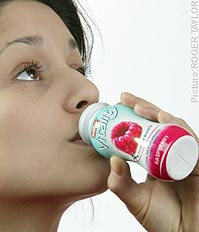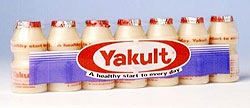 |  | The 'friendly' bug we all want to catch
(Filed: 08/03/2005) |

 Bacteria straight off the shelf Bacteria straight off the shelf

Some bacteria are good for you, says the marketing, but is there any hard evidence of medical benefits? Bryony Gordon reports Around
10 years ago, when I was a spotty, malnourished teenager, my mother
returned from the supermarket with a stack of yogurt drinks. They were
probiotics, she said, full of "friendly bacteria" that would do me the
world of good. Yet when I asked her how exactly they would make me feel
better, it soon became clear that she hadn't a clue.  | | | Gut feeling: probiotics are said to promote a stable balance of bacteria in our intestines |
A
decade later, the probiotic market is worth £213 million in Britain
alone, but we seem no clearer about how the products work and what they
do; last month Tesco reported that customers were buying the
supplements to cure hangovers, despite the fact that they do nothing of
the sort. They are said to contribute to a stable
balance of good bacteria, known as gut flora, that live in our
intestines. This balance helps to make vital nutrients and keeps our
digestive systems healthy, but stress, antibiotics and illnesses that
cause diarrhoea can upset levels of the flora. Hence the need for
probiotics. But does the average human being –
when not suffering from such problems – need to increase his quota of
friendly bacteria, as the makers of these products would have us
believe? "Topping up your bacteria with fermented
milk – of which these drinks are essentially modified versions – has
been part of our diet for thousands of years," says Professor Jeremy
Hamilton-Miller, a microbiologist who has studied probiotic
supplements. "So it's perfectly natural to incorporate these yogurts
into your diet. But I think the manufacturers need to be a lot clearer
about what the supplements actually do." In other words, general claims
about "feeling good" have made consumers think that probiotics will
help cure a variety of ailments. There are,
however, specific illnesses that probiotics have been shown to help.
Lactobacillus GG, for instance, can help prevent diarrhoea, while
others can ease constipation. Certain types have been found to relieve
the effects of ulcerative colitis, and various strains have been shown
to increase levels of Vitamin K, to decrease the risk of bowel and
colon cancers and to cut cholesterol levels. A
Swedish study found that babies who were given the probiotic
Lactobacillus Reuteri during the first six months of their lives were
less likely to develop allergies and asthma. Probiotics
also have potential benefits for the elderly, says Jackie Lowden of the
British Dietetic Association. "There is evidence that the levels of
good bacteria in our bodies decline with age," she says. "And there
have been studies that suggest other benefits; some probiotics are said
to suppress quantities of Helicobacter Pylori, which has been linked
with peptic ulcers and gastric cancers." Some research shows that
probiotics may help with irritable bowel syndrome, she adds. However,
many have questioned how many of the good bacteria actually reach the
gut, because acid and bile in the stomach are known to kill probiotics.
Furthermore, when Prof Hamilton-Miller carried out a study into the
effectiveness of probiotic supplements last year, he found that only a
third of the products did what they claimed to do, and one was
completely sterile. He will not name the unsatisfactory ones, because
he has been threatened with legal action. "I found
that the range of probiotics was extraordinary," he says. "Some had
billions of bacteria in them; one had nothing in it at all; others
contained organisms that just shouldn't have been there." But
if we do want to take them, is there a way of doing so naturally? The
answer is no, although we can ingest prebiotics, the micro-organisms on
which probiotics live. These can be found in bananas, asparagus,
onions, tomatoes, leeks, cucumber, chickpeas, peas and sunflower seeds,
and some probiotic products now include them. Prof
Hamilton-Miller says the key to buying probiotics is to buy them long
before their sell-by date and to keep them refrigerated. "If you don't
treat bacteria properly, they will die." He adds that probiotics
advertised on television or radio are likely to be of high quality, as
they are vetted by advertising standards bodies. "There
is obviously a role for probiotics in the diets of certain people,"
says Lowden. "Yet there are huge issues over whether we all need to
take them; the fact that they won't do us any damage means we carry on
buying them." To many, however, £213 million might seem an awful lot of
money to spend on something we may not even need. Bacteria straight off the shelf  | | May be useful for constipation: Yakult |
Yakult £2.60 for a pack of seven bottles Yakult
contains just one strain of bacterium, Lactobacillus casei Shirota, of
which there are 6.5 billion in each bottle. Two studies – one in
Holland, the other in Britain – have shown that the strain is resistant
to stomach acid, although Prof Colette Short, the company's science
director admits: "Not all of the bacteria survive, but a sufficient
amount live to flourish within the gut." Yakult,
like all of the major probiotic brands, makes no specific claims about
the health benefits of its product. "We are a quality probiotic which
tops up the bacteria in the body," says Prof Short. "We are focused on
the gut health environment, intestinal balance and the digestive health
benefits that may bring." However, Lactobacillus casei Shirota has been
shown to improve bowel regularity, so may be useful for constipation. Danone Actimel £1.34 for four, or £2.48 for eight "Feel
the difference in two weeks," boasts the advert for Actimel. And what,
exactly, is that difference? This is difficult to pinpoint. A
spokeswoman says it is based on the months of September and October
last year, when, of the 9.5 million consumers who bought Actimel, only
45 people asked for their money back, because they didn't feel any
different. More specifically, the Lactobacillus
casei Imunitass strain – of which there are 10 billion in each 100ml
serving – has been shown to reduce the duration, incidence and symptoms
of diarrhoea in children, and reduce episodes of illness in people over
60. Like Yakult's bacteria, Lactobacillus casei Imunitass is resistant
to gastric acidity; a spokeswoman claims that a 2002 study shows "that
the bacteria reach the gut in viable quantities – although the exact
number will, of course, vary from person to person." Multibionta Advanced Formula £4.59 for 30 tablets; £8.19 for 60 Unlike
most of the big probiotic supplements on the market, Multibionta is in
tablet form – the bacteria are freeze-dried so that they remain alive.
The advantage of having a probiotic in this form is that Seven Seas is
able to put a special gastric-resistant coating on each tablet,
ensuring that all 10 million bacteria reach the gut. Multibionta
contains Tribion Harmonis, which is a blend of three probiotic strains:
Lactobacillus gasseri, Bifidobacterium bifidum and Bifidobacterium
longum. The Lactobacillus is active in the upper part of the
gastrointestinal tract, while the Bifidobacterium is active in the
lower area, which means that the entire tract is protected against
harmful bacteria. Muller Vitality £1.48 for six Muller
contains 10 billion of the probiotics Lactobacillus acidophilus and
Bifidobacterium which, like Multibionta, work on different parts of the
gut, ensuring the whole area is covered. It also contains Inulin, a
prebiotic which stimulates the effect of probiotics – Bifidobacteria,
in particular. Muller Vitality claims to "give
balance to your digestive system". When pressed for more specific
information, a spokeswoman said that "there is growing scientific
evidence to support the concept that the maintenance of healthy gut
microflora may provide protection against gastrointestinal disorders." All
information has been verified by Dr Kieran Tuohy, of the University of
Reading. All products are available from major supermarkets

Previous story: Kitted out: kites
Next story: Crazy race, crazy guys

|




![]()